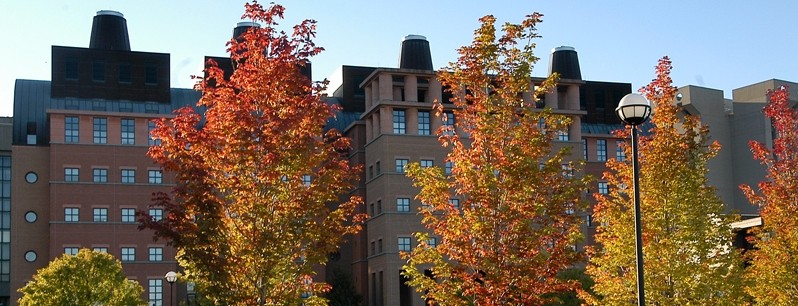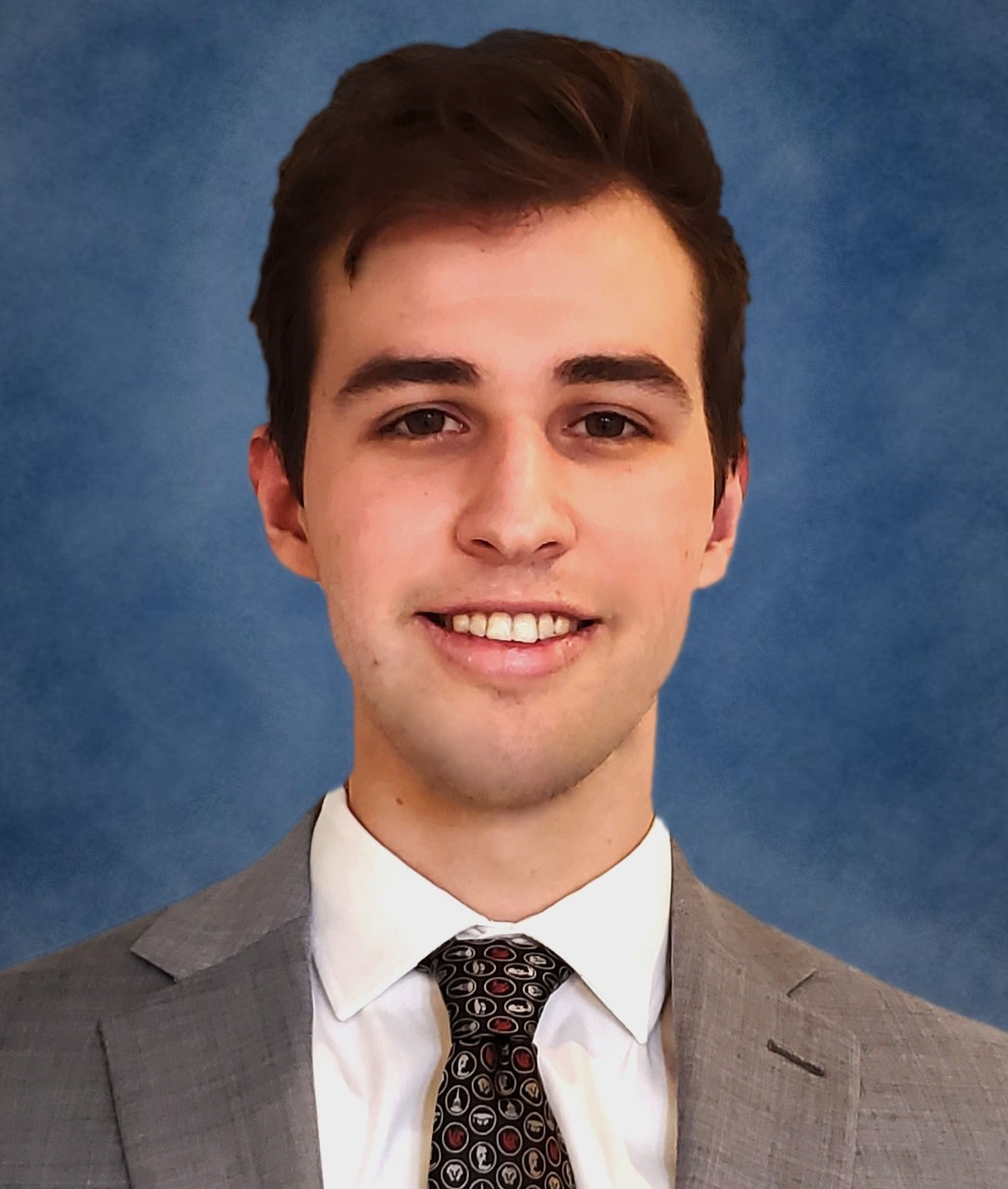
UC doctoral student blends biology, chemical engineering
Jacob Orkwis is developing engineered biomaterials for tissue repair
After paving a path toward medical school, Jacob Orkwis realized the clinical setting didn’t fit his vision for the future. Orkwis, who has a bachelor’s degree in biology from the University of Cincinnati and is a lifelong Bearcats sports fan, is pursuing a Ph.D. in chemical engineering at UC. His research work on the regeneration of peripheral nervous system tissue blends his biology background with chemical, electrical, biomedical and materials engineering. Orkwis was named Graduate Student Engineer of the Month by UC’s College of Engineering and Applied Science.
You're working on your second UC degree. What made you choose to become a Bearcat?
I’m a Bearcat legacy. My dad would bring me to football games as a kid and I still distinctly remember playing on those vents just outside of the Engineering Research Center [now the Mantei Center]. I grew up watching the old Bob Huggins and Mick Cronin basketball teams. I’ve seen the football program explode since I’ve been alive. My older brother also attended UC for his undergraduate degree. My younger brother followed me — and he’s just starting in graduate school here as well. We’re Cincinnati through and through.
What was your path to chemical engineering?

Jacob Orkwis. Photo/provided.
I wanted to go to medical school after finishing my degree in biology. But by the time I started preparing for the MCAT, I began to lose interest in the hospital setting. I ended up trying to pursue a master’s in biomedical engineering to add an engineering component to my background. Dr. Greg Harris, assistant professor of chemical engineering, reached out and gave me a choice to pursue chemical engineering as a degree and I liked the idea of a new challenge outside of medicine. Ironically, the integrative nature of our lab means that I’m still firmly entrenched in the biomedical field and I still have the chance to work with doctors and scientists.
Describe your research work. What problems do you hope to solve?
Our lab specializes in the development of engineered biomaterials for tissue repair. My project is now focused on the use of electrospun fiber scaffolds for nerve regeneration. I enjoy the cross section of disciplines we utilize — everything from electrical engineering to molecular pharmacology is fair game.
Dr. Harris has been a social butterfly in getting us into collaborations with labs all over campus and around Cincinnati in general. He also gives me some freedom to pursue abstract projects. For instance, we needed a method to automate very specific disturbances applied to our biomaterials, so when the pandemic started I began working with those Microcontrollers and learning some basic C++ coding, CAD, and circuits to build my own actuator. I’m trying to learn a little Python now too. As a science undergrad I’m happy to gain this kind of technical experience that a lot of engineers get introduced to early on. I wish I’d had the initiative to pursue those interests in high school; but it’s never too late.
As a science undergrad I’m happy to gain this kind of technical experience that a lot of engineers get introduced to early on. I wish I’d had the initiative to pursue those interests in high school; but it’s never too late.
Jacob Orkwis chemical engineering doctoral student
Eventually I want to provide cheaper, less invasive surgical options for victims of traumatic accidents. The beauty of our work is that tissue engineering can be applied to solve so many different medical problems in a number of different regions of the body. So, while I love working in neuroscience, I’m also passionate about the development of medicine and substrates for other applications. Biotech is a blossoming industry so I’m sure it will fall into place.
I want to work somewhere in biotech, preferably with some involvement in a unique startup. I think the idea of building something from the ground up is appealing. And since Dr. Harris was a somewhat new professor when I started, I’ve had a little experience in trying to get research off the ground and running.
What experiences stand out from your time at UC?
- I got my start in research as a biology undergraduate by working at the Center for Research of Endangered Wildlife at the Cincinnati Zoo. Many people know that our zoo is one of the world’s best, but few are aware they also have an award-winning conservation center. Dr. Valerie Pence runs the plant lab there and Dr. Theresa Culley, who runs the plant lab at UC, put us in touch. I really loved having a free pass to the zoo as well.
- Peer mentorship — I was a Peer Leader as an undergraduate and led a learning community of science and pre-health students for three years. I still occasionally see my former students around campus, throughout the city, and one of them is even working in our lab now. It means everything to see them doing well.
- I also love the global aspect of UC. I’ve been fortunate to meet students from all over the world — both while studying abroad and at UC domestically. I grew up in the Cincinnati Catholic high school “bubble,” which was great too. But it wasn’t until I got to UC and began interacting with students from Chongqing (I traveled to China as a student diplomat in UC’s Joint Co-op Institute program), Tokyo, Thailand, Europe and India, that I realized how immersive this campus community is on a global platform. Cincinnati has a nice blend of different cultures and really has a spot for everyone.
- Beating Notre Dame in South Bend and singing Sweet Caroline with the massive contingent of Bearcat fans in South Bend was something I’ll never forget either.
What motivates you to work hard every day in your field?
It’s two-fold. On one hand you have to go in every day believing that your work can make a difference — whether in your field, in someone’s life, or in the advancement of research in general. So, you have to stay up to date with the latest studies, the latest trends in medicine, and so on.
But additionally, like anything else, a Ph.D. is a challenge to keep improving your knowledge and skillset. Like with learning the C++ and Python, you should always be up to the task of tackling new challenges. Dr. Jeff Kastner, associate professor educator of engineering education, made a point to me about seven years ago while discussing ways to keep your mind sharp — I think he was talking about playing guitar — and that always stuck with me. So, I try to keep up with new hobbies outside of the lab as well. I’m really passionate about rock climbing.
How do you like to spend your time outside of the lab?
I’m a part of the UC chapter of the American Society for Engineering Education. With all the talk about research, I also feel passionate about being an instructor and encouraging the next generation of students to pursue engineering. If you have the chance, go check us out on CampusLINK.
I’m a diehard UC Athletics fan (and we belong in the playoffs). This football season has been really special and if you haven’t had the chance to enjoy it yet I strongly encourage everyone to go out and support the team. Go Bearcats!
Explore CEAS
Learn more about research labs and majors and programs at UC's College of Engineering and Applied Science. Apply today!
Related Stories
PHOTOS: 2025 DAAP Fashion Show
May 9, 2025
Over 900 people attended DAAPFASH25, a fashion show that highlights the collections of the fashion design Class of 2025. The show is now in its 72nd year.
UC lab-on-a-chip devices take public health into home
May 8, 2025
University of Cincinnati engineers created a new device to help doctors diagnose depression and anxiety. The “lab-on-a-chip” device measures the stress hormone cortisol from a patient’s saliva. Knowing if a patient has elevated stress hormones can provide useful diagnostic information even if patients do not report feelings of anxiety, stress or depression in a standard mental health questionnaire.
UC engineering camps leave lasting impact
May 8, 2025
Every summer, hundreds of local and out-of-state high school students come to the University of Cincinnati for immersive, enriching, engineering experiences through various summer camps. Hosted by the Office of Professional Development and Community Impact at the College of Engineering and Applied Science, these camps not only ignite students’ passion for STEM, but also introduce them to life on a college campus.
